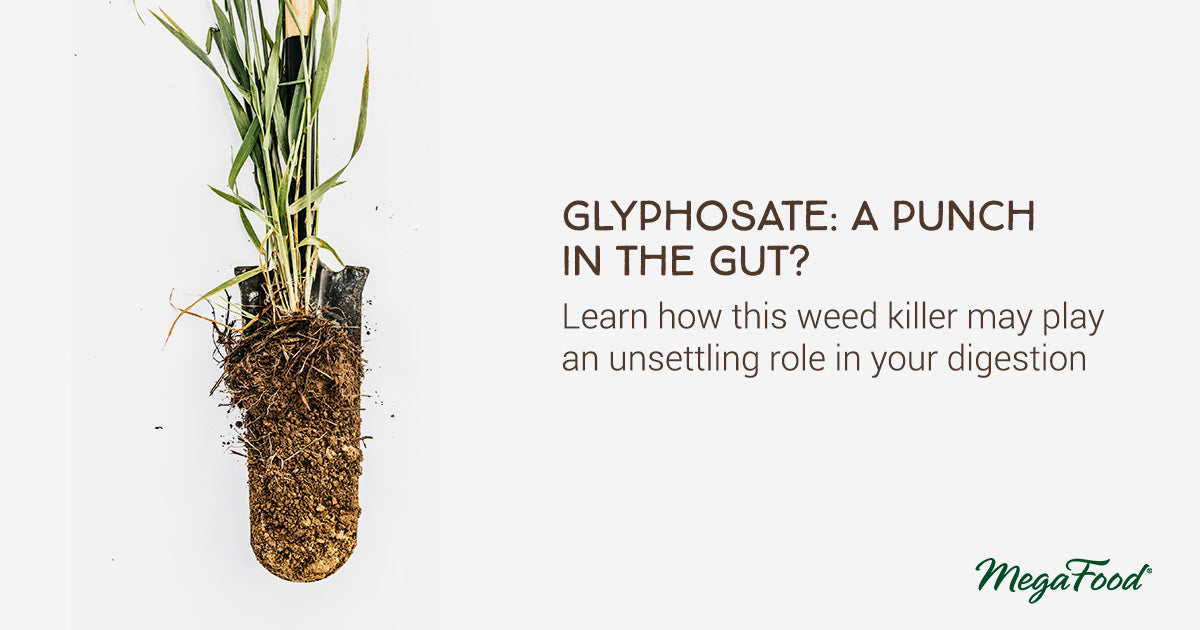Glyphosate: A destroyer of gut health?

Erin Stokes, Naturopathic Doctor, MegaFood Medical Director | November 2018
Did you know that glyphosate is the number one herbicide used in the United States?
Herbicides are chemical substances used in agricultural practices to inhibit undesirable plants - hence the commonly used term “weed killer.” Yet if herbicides are toxic to weeds, aren’t they toxic to the plants we consume? And, can they be harmful to humans? A brief history, and a few bits of life science, will help to answer your questions.
The history
Glyphosate, or “Round Up®“ as you may know it, was first introduced back in 1974. Yet its use has increased dramatically in the last two decades, in part because it’s no longer used just as an herbicide. Glyphosate is also sprayed directly on crops as a drying agent, or desiccant, to speed up their readiness for harvest.
“Globally, glyphosate use has risen almost 15-fold since “Roundup Ready,” genetically engineered glyphosate-tolerant crops were introduced in 1996.”Footnote 1 This reveals the close connection between glyphosate and GMOs, genetically modified organisms. These crops had to be specifically modified to be resistant to the herbicide, such that glyphosate could be sprayed to kill other plants, but not them. Many people now know that glyphosate is widely sprayed on conventionally grown crops. What they may not realize is that glyphosate is also sprayed across the country in public parks and at schools as a way to get that cosmetically “perfect” green grass, unless your town has a specific ban on the substance.
The herbology
Glyphosate is broad-spectrum herbicide, meaning that it kills a wide variety of vegetation. It acts somewhat indiscriminately on plants, except on the previously mentioned glyphosate resistant genetically modified crops. But what glyphosate also kills is microbial life in the soil. This is a big problem because we need healthy soil, full of beneficial microorganisms, to grow healthy food! In addition, glyphosate chelates, or binds, minerals which makes them unavailable for plant uptake. In other words, the nutrient value of your carrots and kale have been compromised, thanks to glyphosate’s mineral greed.
The biology
When it comes to the microbiome, we know healthy gut bacteria is a key ingredient of human health and wellness. The beneficial bacteria in our gut help support optimal digestive and immune function, both of which are cornerstones of health. These “good” bacteria also produce a variety of nutrients, including short-chain fatty acids, B vitamins, and vitamin K.Footnote 2 Perhaps most importantly, beneficial bacteria prevents the “bad” bacteria from growing, and causing disease.
When people ingest glyphosate, it may act as a broad-spectrum antibiotic in our gastrointestinal tract. Essentially, glyphosate “has been shown to disrupt gut bacteria in animals, preferentially killing beneficial forms and causing an overgrowth of pathogensFootnote 3 hence affecting our immune health. As people often turn to probiotics to restore the balance of beneficial gut bacteria after a round of flora-destructive antibiotics, consider the detrimental effect a routine ingestion of glyphosate, an antibiotic in itself, could have. Furthermore, studies have provided evidence that glyphosate exposure can speed up the resistance to antibiotics when they are needed. It’s a vicious cycle.
Act to avoid it
Understanding the importance of healthy soil for healthy food, and the crucial role of our microbiome to overall gut health, we all want to keep our glyphosate exposure to a minimum. At MegaFood, we believe that glyphosate shouldn’t be anywhere near our food. Consider these five ways to avoid it at your table, and seek a Certified Glyphosate Residue Free probiotic to keep your flora flourishing.*
While taking a probiotic alone won't solve the overall problem, MegaFood is doing advocacy work that will. That’s Nutrition with Ambition™. You can sign our petition to the EPA, which is just the beginning of our mission to ban glyphosate for good.
Does the glyphosate-gut connection leave you questioning your digestive health? Learn more about your microbiome, and how to help it thrive.
1 1. Environ Sci Eur. 2016; 28(1):3 Trends in glyphosate herbicide use in the United States and globally. Charles M. Benbrook 2Ramakrishna, Balakrishnan S. Role of the gut microbiota in human nutrition and metabolism. Journal of Gastroenterology and Hepatology, 2012. 3Interdiscip Toxicol. 2013 Dec; 6(4): 159–184. Glyphosate, pathways to modern diseases II: Celiac sprue and gluten intolerance. Anthony Samsel and Stephanie Seneff.



Leave a comment
This site is protected by hCaptcha and the hCaptcha Privacy Policy and Terms of Service apply.